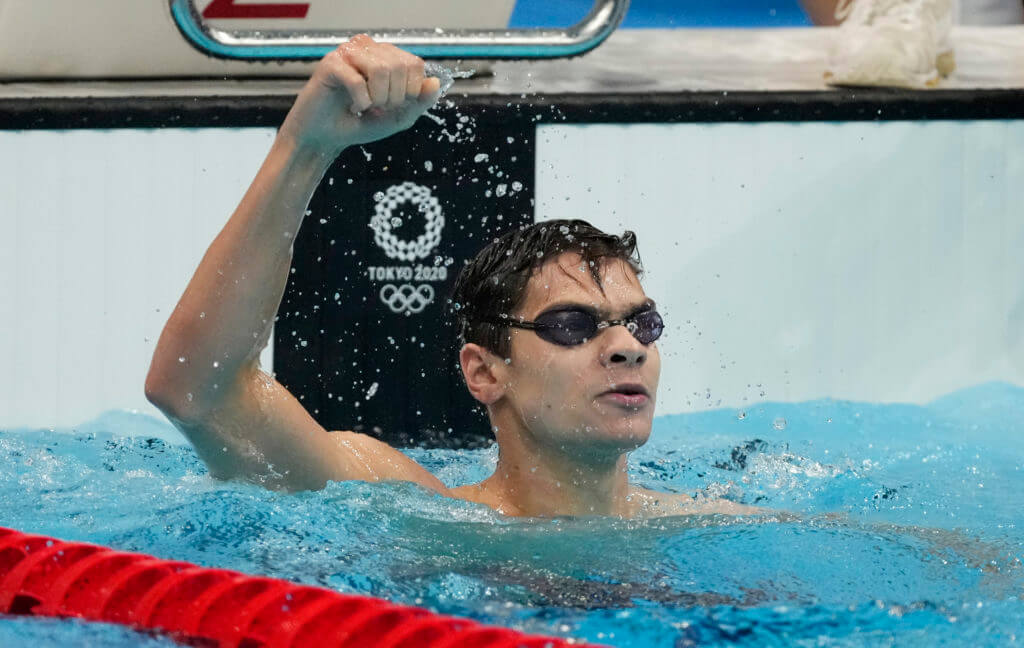Tokyo Flashback: Evgeny Rylov Headlines Russian Dominance in 100 Backstroke As U.S. Streak Snapped

Editorial content for the 2021 Tokyo Olympic Games coverage is sponsored by GMX7.
See full event coverage. Follow GMX7 on Instagram at @GMX7training #gmx7

Olympics: Evgeny Rylov Headlines Russian Dominance in 100 Backstroke As U.S. Streak Snapped
One year has passed since the Olympic Games, delayed by a year due to COVID-19, unfolded in Tokyo. To celebrate what went down in the Japanese capital, Swimming World is revisiting the championship finals – each on their one-year anniversary – by once again running the stories that were posted after the medals were decided.
Consistent dominance on the world stage is hard to maintain. The cyclical nature of sports generally leads to a downturn or bump at varying points. More, premier nations and athletes are constantly targeted by the opposition, which enters the competitive arena with a sole focus: Take down the king.
So, the fact that the United States entered the Olympic Games with six-Olympiad winning streaks in both men’s backstroke events is difficult to fathom. It meant that at every Games since 1996, the Star Spangled Banner played for an American star who found a way to successfully navigate a minefield of challengers.
In Tokyo, the streak came to an end.
Emerging as the class of the field from the start, the Russian tandem of Evgeny Rylov and Kliment Kolesnikov won gold and silver medals, with Rylov edging his countryman, 51.98 to 52.00. Defending champion Ryan Murphy of the United States made a push in the closing meters and added a bronze to his Olympic-medal collection, as he touched the wall in 52.19. Italian Thomas Ceccon clocked 52.30 to finish fourth.
“I’m full of emotions after the swim,” Rylov said through an interpreter. “Now I’ve come here but I don’t realize that I’m an Olympic champion. Yesterday I felt bad, not physically but in general, it just was not good. Today, I pulled myself up and thank God I made it, so I’m really happy that I concentrated and focused on this race.”
Best known for his prowess in the 200 backstroke, where he is the world champion, Rylov didn’t look sharp during the preliminaries or semifinals of the 100 back. Was he not in top form? Was he holding back? Those were the primary questions asked about the Russian. Obviously, he was sandbagging – and doing only what was necessary to advance through the rounds, an approach that American Aaron Peirsol perfected during his career. Under the bright lights, Rylov came through, his winning time good for a European record.
Racing out of Lane Two, Rylov was second at the turn, with his split of 24.96 behind the 24.90 of Kolesnikov. That outcome was expected, since Kolesnikov possessed the most speed in the field and is the world-record holder in the 50 backstroke. Down the last lap, Rylov allowed his endurance to carry him, and while Kolesnikov – more of a pure sprinter – fought feverishly, Rylov eked out the victory. The performance bodes well for the 200 backstroke later in the week, where Rylov is even stronger and the favorite for gold.
Rylov credited the work he and Kolesnikov, the purer sprinter, have done in helping each other refine their specialities. Kolesnikov’s speed pushed Rylov to refocus on the shorter race.
“It started in 2018,” Rylov said. “I was concentrating on the 200 backstroke but then the 100 appeared. When I understood that Kliment was winning, I decided that I didn’t want to lose and I decided to push the 100 more.”
In the history books, the medals won by Rylov and Kolesnikov will be recorded for the Russian Olympic Committee, the name being used in Tokyo as “punishment” for Russia’s state-sponsored doping program. During the medals ceremony, alternate flags were raised and the Russian anthem was replaced by Piano Concerto No. 1, composed by Pyotr Tchaikovsky.
With Rylov on top of the podium, it marked the first time since 1992 in which an American was not in that position. The U.S. streak started in 1996 when Jeff Rouse was crowned champion. He was followed by Lenny Krayzelburg (2000), Peirsol (2004/2008), Matt Grevers (2012) and Murphy (2016).
Murphy’s bronze medal arrived behind a gutsy effort that saw the Team USA captain close ground on the Russians in the final strokes. Murphy covered the last 50 meters in 26.93, joining Ceccon as the only two men to go sub-27 on the last lap. Murphy will get another chance at Rylov in the 200 backstroke, with Murphy again the defending champion.
“It’s definitely a mix of emotions,” Murphy said. “Being third in the world is no shame, but obviously you want to go out there and win. That was the best I had this day. Hats off to the Russian guys.”
Men’s 100 Backstroke
World Record: Ryan Murphy, United States, 51.85 (2016)
Olympic Record: Ryan Murphy, United States, 51.85 (2016)
Final Results
1. Evgeny Rylov (Russia) 51.98
2. Kliment Kolesnikov (Russia) 52.00
3. Ryan Murphy (United States) 52.19
4. Thomas Ceccon (Italy) 52.30
5. Xu Jiayu (China) 52.51
6. Hugo Gonzalez (Spain) 52.78
7. Mitch Larkin (Australia) 52.79
8. Robert Glinta (Romania) 52.95




